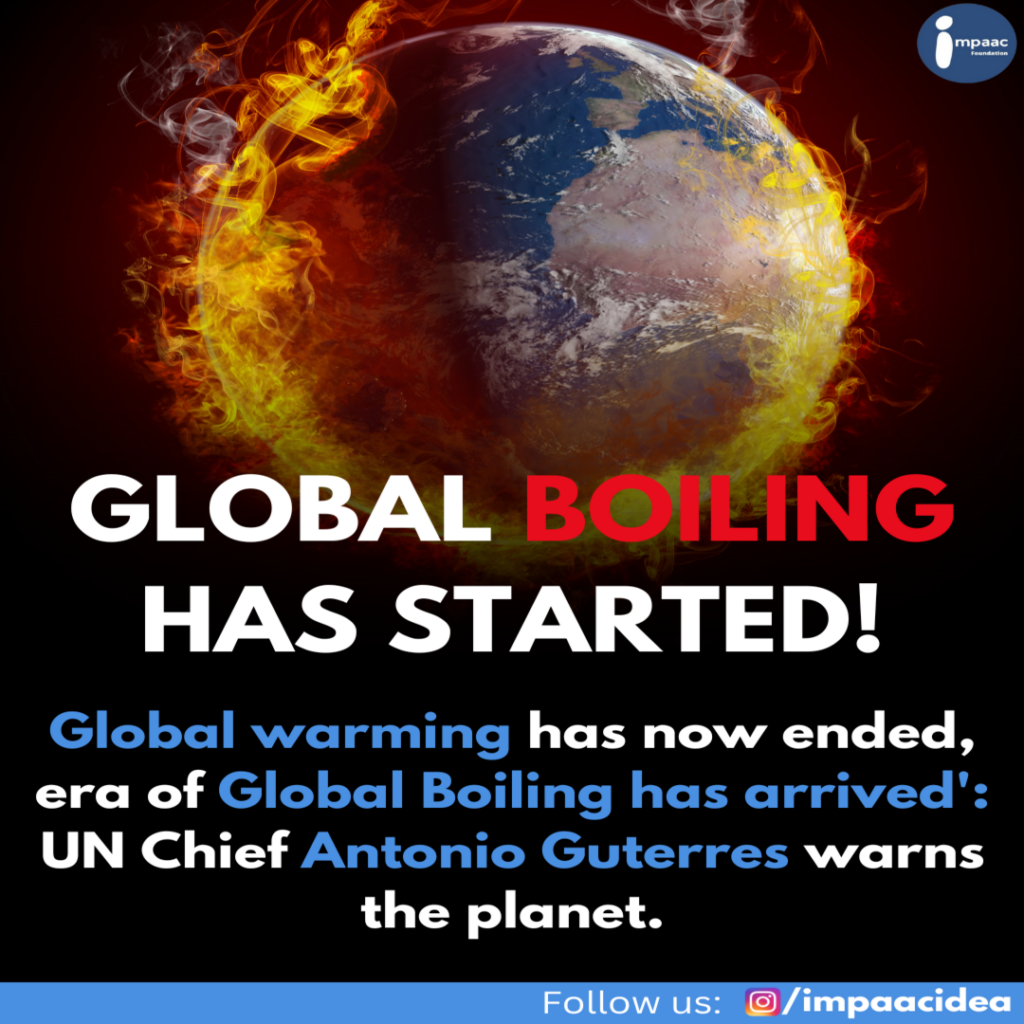With an urgent call to action, UN Chief Antonio Guterres delivers a stark message that shakes the world to its core. The era of global warming has passed, and now we face a new, ominous reality—the era of “Global Boiling.” The planet’s temperature continues to rise, signaling a critical juncture in our fight against climate change.
As temperatures soar and extreme weather events become more frequent, the warning signs are clear. We must unite as a global community to confront this unprecedented crisis. The time for inaction has long passed, and now, we must act with unparalleled determination and resolve.
The consequences of “Global Boiling” are far-reaching, affecting ecosystems, wildlife, and human lives. It demands a collective effort from governments, industries, communities, and individuals to drastically reduce greenhouse gas emissions, transition to renewable energy sources, and protect vulnerable habitats.
As the heat intensifies, we must come together to implement sustainable practices, prioritize conservation, and prioritize the well-being of future generations. Our choices today will shape the world they inherit tomorrow. Let us unite as stewards of the planet, determined to leave behind a legacy of hope, not devastation.
The time to act is now. Each small step we take towards a greener, cleaner future contributes to a global movement of resilience and restoration. By standing together, we can create a world where the era of “Global Boiling” is but a memory, replaced by an era of hope and harmony with nature.
Let us heed the warning from UN Chief Antonio Guterres and rise to the challenge of safeguarding our planet. Together, we can forge a path towards a sustainable future—one that rekindles hope, restores balance, and ensures a planet that thrives for generations to come.
In this critical moment, it is essential to recognize that addressing “Global Boiling” requires a comprehensive and multi-faceted approach. Here are some additional points :
1. Climate Justice and Equity: As we tackle the impacts of “Global Boiling,” we must prioritize climate justice and equity. The effects of climate change disproportionately affect vulnerable communities, particularly in developing countries and marginalized populations. We need to ensure that climate action is inclusive and takes into account the needs of those most affected.
2. Technology and Innovation: Embracing technology and fostering innovation can accelerate our transition to a sustainable future. Governments, businesses, and individuals must invest in renewable energy technologies, energy efficiency, and sustainable practices to reduce our carbon footprint.
3. Protecting Biodiversity: The rising temperatures and extreme weather events threaten biodiversity worldwide. Conserving and restoring ecosystems and protecting wildlife habitats are crucial to maintaining ecological balance and preserving the natural world’s richness.
4. Sustainable Agriculture and Food Systems: Agriculture is a significant contributor to greenhouse gas emissions. Transitioning to sustainable agricultural practices, promoting local and organic food production, and reducing food waste are pivotal steps in mitigating the impacts of “Global Boiling.”
5. Resilience and Adaptation: While we work to reduce emissions, we must also invest in building resilience and adapting to the changing climate. Supporting communities in vulnerable regions with climate-adaptive infrastructure and disaster preparedness can enhance their ability to cope with extreme weather events.
6. The Role of Corporations: Corporations and industries have a significant role in combating “Global Boiling.” Encouraging businesses to adopt sustainable practices, reduce emissions, and prioritize environmental stewardship can lead to transformative change.
7. Public Awareness and Education: Raising awareness about the urgency of “Global Boiling” is vital. Educational campaigns, community outreach, and media initiatives can empower individuals to take climate action in their daily lives and demand change from policymakers.
8. Political Will and International Cooperation: Tackling a crisis of this scale necessitates strong political will and international cooperation. World leaders must collaborate on climate agreements and commitments to ensure global efforts to combat “Global Boiling.”
9. Personal Responsibility: Each of us has a role to play in addressing “Global Boiling.” Making sustainable choices, reducing our carbon footprint, and advocating for climate action can collectively make a significant impact.
10. Investing in Renewable Energy: Transitioning from fossil fuels to renewable energy sources, such as solar, wind, and hydroelectric power, is pivotal in curbing greenhouse gas emissions and reducing our dependence on finite resources.
11. Youth Activism and Engagement: Young people around the world are leading the charge in demanding climate action. Supporting and amplifying youth voices can inspire positive change and foster a sense of urgency in addressing “Global Boiling.”
In conclusion, the era of “Global Boiling” demands an unprecedented global response. It is time to act decisively, leaving behind the era of inaction and embracing a sustainable, equitable, and resilient future. By joining hands and working together, we can steer the trajectory of our planet towards hope, harmony, and a thriving world for generations to come.





